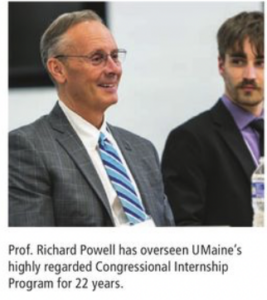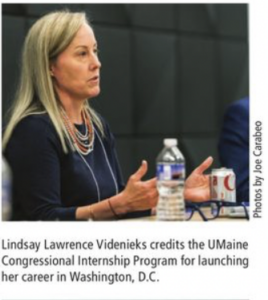UMaine’s Congressional Internship Program marks 65 years
By Allen Adams ’14
[To view story in the MAINE Alumni Magazine, click here]
The University of Maine’s Congressional Internship Program recently marked its 65th year of providing UMaine students with the opportunity to work in the offices of a Congressional delegation.
That longevity speaks for itself, yet there are generations of people – students and faculty alike – who have plenty to say about the program’s benefits.
“To my mind, it’s the best program of its kind in the country.”
That’s Ken Palmer, emeritus professor of political science and the man who ran the internship program from the late 1960s all the way up into the early ‘00s, but the thought was echoed by everyone to whom I spoke.
And I do mean everyone. The passion for this program radiated from every interviewee. No matter the speaker, the sentiment was the same – this program is the best.
The program was born in 1958 when Professor Edward Dow placed two students in Congressional offices — one with Senator Edmund S. Muskie, the other with Senator Frederick Paine. It was an offshoot of a program that Dow had established a decade earlier, wherein students studying public management were placed with town and city managers to prepare them for that career path.
The program selects four interns — one for each of Maine’s two Senators and Representatives — from a competitive candidate pool. The interns then spend the spring semester of their junior year working in a Congressional office. They are essentially employees with an employee’s workload, all while also participating in seminars and completing assignments to fulfill their academic obligations.
Palmer took the program’s reins in 1969 and led it until 2001.
“Ed Dow was a strong believer that you could learn outside the classroom,” said Palmer. “And Ed Muskie was one of the first elected officials to help us make it happen. He persuaded his delegation to take on students as interns; it turned out so well that [Muskie] would sometimes bring two onboard.”
Palmer attributes the program’s success to three primary factors: the buy-in of the delegations, the high performance of the students, and Maine’s tendency toward civic engagement.
“It was an innovative program,” Palmer said. “The students really took to it; the Representatives and Senators welcomed and engaged the students. Plus, the state’s high level of participation in all parts of the process made Maine a great place for this to thrive.”
Professor Rich Powell from the Department of Political Science took over the program in 2001. He echoed Palmer’s sentiments regarding its quality and takes pride in its history.
 “We actually think it might be the longest continuously operating Congressional internship in Washington,” said Powell. “We have no way to know that for sure, but we’ve never discovered one that we know to be older.”
“We actually think it might be the longest continuously operating Congressional internship in Washington,” said Powell. “We have no way to know that for sure, but we’ve never discovered one that we know to be older.”
Powell notes that anyone who lands one of these coveted spots better be prepared to work.
“These are full-time positions. They work full-time. And they’re earning a full semester’s course work at the same time,” Powell said. “They have the full-time work and then they do an academic seminar with us as well. I travel down to D.C. three times a semester and lead an evening seminar in which they have readings.
“We’ll invite practitioners from Washington, D.C., who are prominent in their respective fields,” he continued. “These folks will come in and meet with them and talk about whatever book it is that we read for that week and share their own personal direct experiences with their careers in Washington, D.C., and politics.”
You’d be hard-pressed to find someone with a broader connection to the program than Peter Madigan ’81, whose participation in 1980 led to a career in Washington, working in the State and Treasury Departments, as well as the White House, before founding a successful lobbying firm. Following his retirement, he became a direct contributor to the program, beginning roughly a dozen years ago.
Madigan assists with providing speakers for the student seminars while also providing support, advice and mentoring to the interns when they are in D.C. He has been a key figure in helping fundraise to ensure that finances are not a barrier to entry.
“It’s such a unique thing, this program,” said Madigan. “It practically guarantees each student far more real-world experience than so many other Capitol Hill internships. I’m familiar with internships from other institutions.”
He paused.
“Ours is better than theirs.”
He also discussed the reputation that UMaine interns have developed.
“Maine students consistently perform beyond already-high expectations,” Madigan said. “A lot is expected of these students and they almost always deliver. Offices know that our students will be there to work and work hard. And afterward, so many alumni wind up hired or directly placed. We’re talking dozens and dozens; that just doesn’t happen.
“If I’m bringing someone in, I want UMaine kids,” he continued. “They’re grateful, they work harder, they’re just better. I want even more UMaine students coming down here to serve.”
Speaking to past interns, it’s clear that the experience was life-altering and trajectory-shifting, leading many to spend time in governmental or public service. And despite the different generations and backgrounds of the people interviewed, their stories felt strikingly similar. The specifics of the “why” took different forms, but generally sprang from the same source.
George Pullen ’02 is a senior economist for the U.S. Commodity Futures Trade Commission. He participated in the program in the spring of 2001, working in the office of Senator Olympia Snowe ’69, ’82 Hon. L.H.D.
“I saw the internship as a way to get involved with something bigger, and that would expose me to what it meant to work in politics and be around politicians in D.C., where it all happens,” Pullen said.
“After Grampy’s barn, Dad’s sawmill, and Parris Island, I needed that internship to teach me how to succeed in an office environment,” he continued. “And the reality of political work versus just politics as something you read or talk about around the dinner table.”
Ben Goodman ’12 currently serves as the press secretary for Governor Janet Mills. His hitch was in Congressman Mike Michaud’s office in 2011, after which he spent a decade working in D.C. before returning to Maine.
“From a very young age, I had been interested in national politics and in Congress,” Goodman said. “I had long wanted to work on Capitol Hill, and was eager to have the opportunity to see Washington politics up close.
“Interning in Congressman Michaud’s office was an incredible, hands-on education,” he added.
Lindsay Videnieks ’99 interned in the office of Congressman John Baldacci ’86 in 1998. She is currently Partner/Senior Vice President at Woodberry Associates, a Washington, DC-based public affairs and government relations firm.
 “I was a political science major and a ‘joiner’ — I wanted to take advantage of all of the opportunities of a University of Maine education,” said Videnieks. “As the daughter of a single mom, I was a commuting student and did not get to experience on-campus life; I thought an internship — especially to Washington, D.C. — would be a way to open a window to a larger world.
“I was a political science major and a ‘joiner’ — I wanted to take advantage of all of the opportunities of a University of Maine education,” said Videnieks. “As the daughter of a single mom, I was a commuting student and did not get to experience on-campus life; I thought an internship — especially to Washington, D.C. — would be a way to open a window to a larger world.
“This internship opened doors for me in Washington, D.C., that have been lifelong.”
Adam Fortier-Brown ’19 interned for Senator Susan Collins ’11 Hon. L.H.D. in 2018. The political science/economics double major currently works as a senior consultant for Deloitte.
“When I learned about the Congressional Internship Program, I saw it as a fantastic opportunity to get involved in policy-making from an entirely different perspective,” Fortier-Brown said. “Having previously interned for my Democratic State Representative, I had some understanding of how politics worked outside of the headlines.
“What interested me most about this program was the understanding that interns wouldn’t be confined to answering phones,” he continued, “but instead would be given the opportunity to actively support and meaningfully contribute to the office’s policy work and initiatives.” That last point bears repeating. UMaine’s program isn’t your typical coffee-and-copies internship, but an opportunity to engage with the actual work. That’s a big reason why it’s so highly regarded by not just the participants, but by those who facilitate that participation.
Often, D.C. internships are just checked boxes on a resume, positions distributed for reasons other than merit. That isn’t the case with UMaine’s Congressional Internship Program, which gives students the opportunity to sit at the table and learn about the process up close and personal. Much is asked of them, but honestly, why wouldn’t it be thus?
After all, it’s the best program of its kind in the country.
